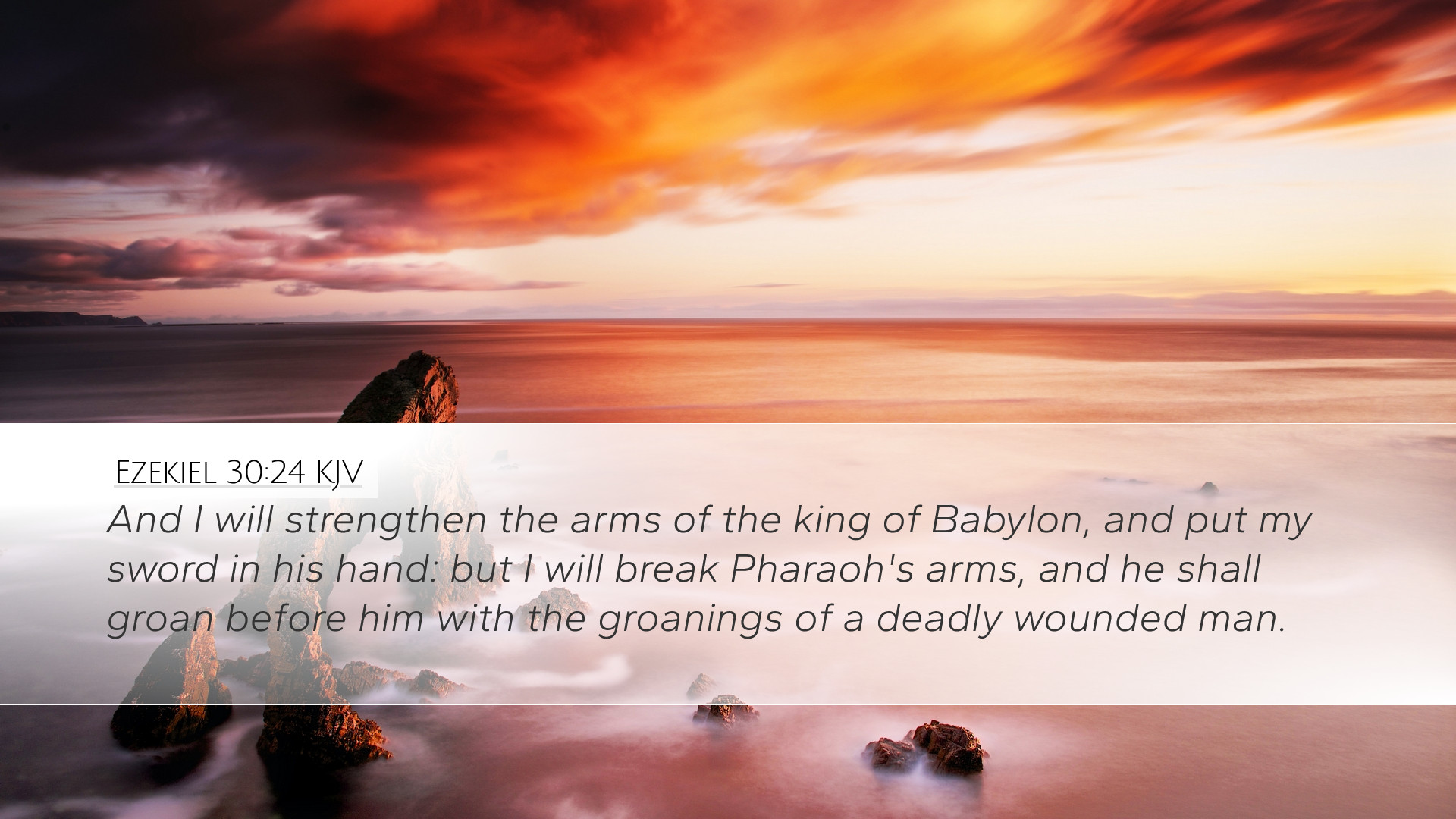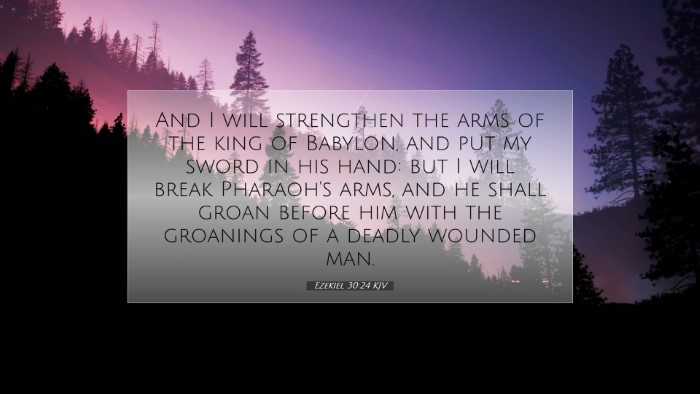Ezekiel 30:24 Commentary
Verse: "And I will strengthen the arms of the king of Babylon, but the arms of Pharaoh shall fall down: and they shall know that I am the LORD, when I shall put my sword into the hand of the king of Babylon, and he shall stretch it out upon the land of Egypt."
Introduction
This verse from Ezekiel presents a powerful declaration from God regarding the fate of Egypt and the role of the king of Babylon in God’s divine plan. It highlights the sovereignty of God in the affairs of nations and the futility of trusting in human power against divine will. The commentaries of Matthew Henry, Albert Barnes, and Adam Clarke provide valuable insights into the theological implications, historical context, and moral lessons found in this passage.
Contextual Background
The Book of Ezekiel, written during the Babylonian exile, employs vivid imagery and prophetic messages to communicate God's judgment against Israel and the surrounding nations. This particular verse is part of a larger prophecy against Egypt, a nation that had historically opposed Israel and sought to maintain its power amidst foreign dominance.
The Rise and Fall of Nations
- Matthew Henry: Henry emphasizes that God is in complete control of earthly powers. The strengthening of Babylon’s king serves to show that earthly kings are mere instruments of God’s will. Henry notes that just as God can elevate rulers, He can also bring them low.
- Albert Barnes: Barnes points out that the mention of Pharaoh symbolizes human pride and reliance on fleshly might, which ultimately leads to downfall. The prophecy becomes a warning against misplaced trust in political alliances that have no foundation in God.
- Adam Clarke: Clarke contextualizes the historical significance by detailing the geopolitical climate of the time, highlighting that Egypt had hoped to recover from the Babylonian threat, but God's decree would prevail over any human ambitions.
Theological Implications
There are profound theological truths embedded in this text that resonate with its audience—pastors, scholars, and students alike. The primary theme illustrates God's sovereignty over the nations, a recurring motif in prophetic literature.
1. Sovereignty of God
- God’s Authority: This verse unequivocally asserts that God delegates authority as He sees fit. The king of Babylon, though a pagan ruler, is utilized as a tool in God's hand to enact judgment upon Egypt.
- Limitations of Human Power: The stark contrast between the empowered Babylon and the powerless Pharaoh serves to remind believers that human strength is insignificant when set against divine purpose.
2. Divine Judgment
- Evident Through Actions: The phrase “they shall know that I am the LORD” indicates that the judgments enacted will lead to an acknowledgment of God's sovereignty. This is not merely punitive but also redemptive, as it calls nations to awareness of the true God.
- Call to Repentance: The prophetic voice through Ezekiel serves as both a warning and an invitation to return to faithfulness towards God—an important message for contemporary believers.
Lessons for Today
The enduring relevance of Ezekiel 30:24 can be seen in its application for today's church and societies. Pastors and theologians can draw from its riches to shape teachings on reliance upon God amidst human uncertainties.
1. Hope Amidst Despair
In a world which often feels chaotic and unstable, this passage reassures believers of God’s unchanging nature and His involvement in human affairs. For those in leadership positions, this serves as a reminder to rely on divine strength rather than worldly strategies.
2. A Call to Faithfulness
As the history of Egypt serves as a cautionary tale, modern congregations are called to place their trust in God rather than in human institutions or power structures. This can ignite conversations around the importance of faithfulness in both personal and corporate spheres.
3. Emphasis on God’s Knowledge
The acknowledgment that “they shall know that I am the LORD” encourages believers to seek to know God more deeply. This thematic focus can foster a greater pursuit of understanding scripture, prayer, and communal worship that recognizes God’s providence.
Conclusion
The commentary on Ezekiel 30:24 effectively encapsulates the profound truths regarding God's governance over human affairs and the expression of His will throughout history. The strengths drawn from the insights of Matthew Henry, Albert Barnes, and Adam Clarke serve to enrich the understanding of this verse, offering both pastors and scholars a deeper appreciation of the text’s implications. Through this passage, we are reminded that while nations may rise and fall, the knowledge of the LORD remains eternally relevant and imperative for all generations.


